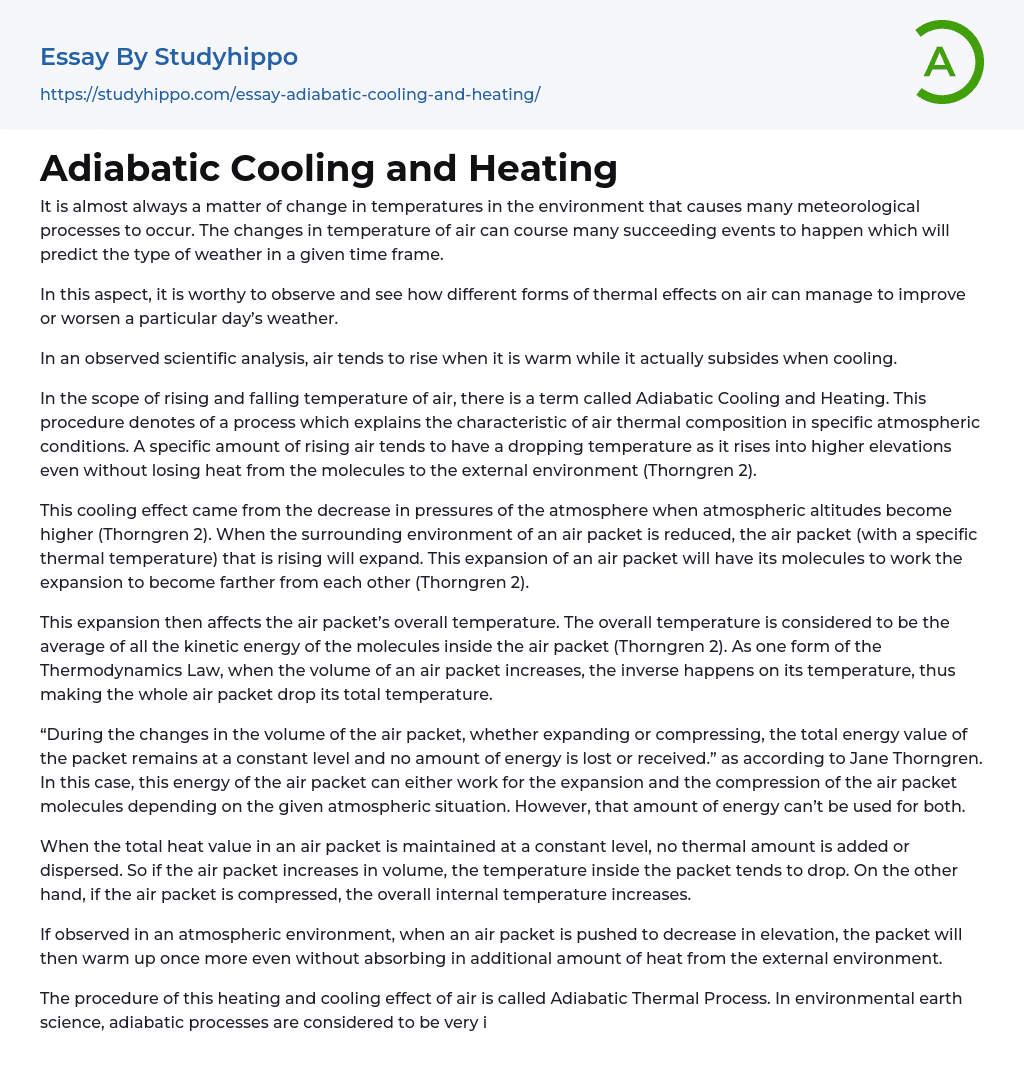It is almost always a matter of change in temperatures in the environment that causes many meteorological processes to occur. The changes in temperature of air can course many succeeding events to happen which will predict the type of weather in a given time frame.
In this aspect, it is worthy to observe and see how different forms of thermal effects on air can manage to improve or worsen a particular day’s weather.
In an observed scientific analysis, air tends to rise when it is warm while it actually subsides when cooling.
In the scope of rising and falling temperature of air, there is a term called Adiabatic Cooling and Heating. This procedure denotes of a process which explains the characteristic of air thermal composition in specific at
...mospheric conditions. A specific amount of rising air tends to have a dropping temperature as it rises into higher elevations even without losing heat from the molecules to the external environment (Thorngren 2).
This cooling effect came from the decrease in pressures of the atmosphere when atmospheric altitudes become higher (Thorngren 2). When the surrounding environment of an air packet is reduced, the air packet (with a specific thermal temperature) that is rising will expand. This expansion of an air packet will have its molecules to work the expansion to become farther from each other (Thorngren 2).
This expansion then affects the air packet’s overall temperature. The overall temperature is considered to be the average of all the kinetic energy of the molecules inside the air packet (Thorngren 2). As one form of the Thermodynamics Law, when the volume
of an air packet increases, the inverse happens on its temperature, thus making the whole air packet drop its total temperature.
“During the changes in the volume of the air packet, whether expanding or compressing, the total energy value of the packet remains at a constant level and no amount of energy is lost or received.” as according to Jane Thorngren. In this case, this energy of the air packet can either work for the expansion and the compression of the air packet molecules depending on the given atmospheric situation. However, that amount of energy can’t be used for both.
When the total heat value in an air packet is maintained at a constant level, no thermal amount is added or dispersed. So if the air packet increases in volume, the temperature inside the packet tends to drop. On the other hand, if the air packet is compressed, the overall internal temperature increases.
If observed in an atmospheric environment, when an air packet is pushed to decrease in elevation, the packet will then warm up once more even without absorbing in additional amount of heat from the external environment.
The procedure of this heating and cooling effect of air is called Adiabatic Thermal Process. In environmental earth science, adiabatic processes are considered to be very important natural phenomenon which is also the main cause of cloud formation (Thorngren 2).
There are three distinct rates for cooling air (Boutell 1). All of them can be observed in the Adiabatic Cooling procedure when the air packet rises to the atmosphere.
Ambient atmosphere lapse rate-This rate is the general form of cooling
rate when an air packet ascends into the atmosphere then drops in overall packet temperature (Boutell 1).
Dry Adiabatic Lapse Rate-This second type of lapse rate happens when there is a change in the temperature of unsaturated as it increases altitude (Thorngren 1). The change in temperature of an air packet as it descends or rises in atmospheric level occurs when there is no condensation taking place. In the atmosphere, the lowering of the temperature in a rising unsaturated air packet is measured at about 10 degree Celsius per 10000 of meter altitude (Boutell 1).
This also equates to 5.5 degree Fahrenheit per 1000 feet. For example, is a packet of air is measured at 30 degrees Celsius at sea level, then it rises to about 1000 meters, its new temperature will go down to 20 degrees Celsius. If it rises again to another 1000 meters, then its temperature will go down to as much as 10 degrees Celsius.
On the other hand, the same Dry Adiabatic Lapse Rate can also be observed when an air packet subsides in altitude. If the air at 5000 meters height form sea level has a thermal value of -10 degrees Celsius and it descends to 4000 meters, the new temperature of warmed air will register a 0 degree Celsius reading.
- Organic Chemistry essays
- Acid essays
- Calcium essays
- Chemical Bond essays
- Chemical Reaction essays
- Chromatography essays
- Ethanol essays
- Hydrogen essays
- Periodic Table essays
- Titration essays
- Chemical reactions essays
- Osmosis essays
- Carbohydrate essays
- Carbon essays
- Ph essays
- Diffusion essays
- Copper essays
- Salt essays
- Concentration essays
- Sodium essays
- Distillation essays
- Amylase essays
- Magnesium essays
- Acid Rain essays
- Atmosphere essays
- Biodiversity essays
- Coral Reef essays
- Desert essays
- Earth essays
- Ecosystem essays
- Forest essays
- Lake essays
- Natural Environment essays
- Ocean essays
- Oxygen essays
- Rainbow essays
- Sea essays
- Soil essays
- Volcano essays
- Water essays
- Wind essays
- Agriculture essays
- Albert einstein essays
- Animals essays
- Archaeology essays
- Bear essays
- Biology essays
- Birds essays
- Butterfly essays
- Cat essays




